| |
| BACKGROUND
SCREENING NEWS |
Ban
the Box" and Pre-Employment Criminal Records Checks - An In-Depth
Look
Representative Hansen Clarke has proposed HR 6220, to prohibit
an employer from inquiring whether an applicant for employment
has been convicted of a criminal offense, except in certain
circumstances. Referred to as the "Ban the Box Act", this bill
is of similar intent to "Second Chance" legislation previously
offered by lawmakers in recent years. ISPLA has reviewed this
13-page bill which seeks to eliminate questions on job applications
regarding whether an applicant might have a criminal conviction
record and to only allow a criminal a criminal background check
to be undertaken after a conditional offer of employment has
been made to the applicant contingent on such records check
being clear. It is the bill sponsor's position that those who
have served their time and paid their debt to society are worthy
of consideration for employment for jobs in which the public
would not be harmed by their presence or work.
To read
more, click
here

Vetting at the Top
Human resource executives and experts say double-
and even triple-checking a C-suite job candidate's resume, references
and educational background isn't just a way to spare the company
from future embarrassment; it also offers career protection
to the candidate who might be able to correct a resume error
before it becomes an indelible stain on his record. Inside candidates
as well as outside hires should be psychologically assessed
and past co-workers should be mined better for information.
Too often, job-seekers for top-level, highly visible posts are
actually vetted with less stringency than lower-level hires,
even in an age when the Internet can both magnify errors and
increase the opportunities for puffery and fraud. Experts recommend
having a standardized procedure in place, which requires background
checks and uses skilled and impartial third-party firms to undertake
that effort, but with the human-resource department involved
and in charge throughout.
To read more, click
here

Could a National Registry Save Hospitals from Hiring Problem
Workers?
As officials continue to investigate the hepatitis
C outbreak, some outraged citizens and healthcare organizations
are calling for a national registry that would require hospitals
and staffing agencies to report professional misconduct by medical
technicians, as well using confidential, third-party reference
checks. State and hospital investigations into the work history
and conduct of David Kwiatkowski, a traveling lab technician
and alleged infector who caused the hepatitis C outbreak at
New Hampshire's Exeter Hospital, bring up questions into oversight
responsibilities. Exeter believer providers and lawmakers should
consider a mandatory reference disclosure process for healthcare
providers to report problems with former employees, establish
legislative protection for hospitals to share information that
relates to criminal activity or threats to patient safety, and
the possibility of a national registry that tracks problems
of all healthcare workers similar to reporting systems for physician
and nurses.
To read more, click here

How to Gather Social Media Evidence
With so much information being exchanged and shared
online, it makes sense to see social media as a rich source
of material for both plaintiffs and defendants to use in investigations.
However, social media evidence has to be gathered in a way that
will hold up in court. So far there are relatively few standardized
methods for gathering evidence from social media sites. Collecting
evidence from social media sites can be challenging because
it is constantly changing, and users can easily update and delete
material that could be evidence in a case. But, once a user
is aware of an ongoing investigation, he or she is under an
obligation to preserve social media evidence just as if it were
any other type of evidence. Additionally, requests to access
an employee's social media account(s) must demonstrate a valid
reason to believe that there's information in their profile
that's relevant to the issue under investigation. Once the evidence
is gathered, it's authenticity must be proven, given the possibility
of impersonation and digital fabrication in the online world.
To read more, click
here

Accuracy in Criminal Background Checks
The federal government has neglected its responsibility for
regulating the companies that provide criminal background checks
used by 9 in 10 companies to screen job applicants. The damage
done to job-seekers by flawed and unreliable data - a common
problem with such services - can be devastating. For the first
time, the Federal Trade Commission (FTC) has charged and settled
a case with one background check company, HireRight Solutions
Inc. The FTC charged that HireRight failed to follow reasonable
procedures to prevent obviously inaccurate information from
being provided to employers and, in many cases, even included
the records of the wrong person. The company signed a consent
decree that requires it to pay $2.6 million, provide consumers
with information in their files in a timely manner upon request,
promptly notify people who dispute their background reports
about the outcomes of the investigation; and update reports
to reflect the expungement or dismissal of criminal charges.
The company must also submit to monitoring by the FTC. The standards
in this settlement should be applied to all such businesses.
To read more,
click here

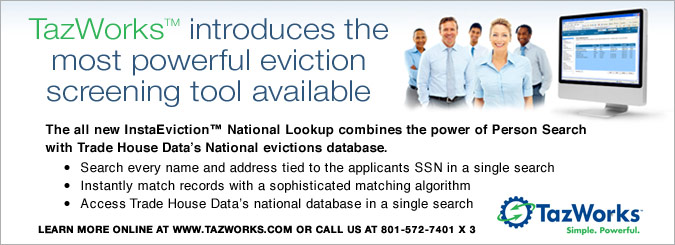

| BACKGROUND
SCREENING NEWS continued |
Conducting
Online Investigations Using Deep Web Resources
An investigative analyst can find information that
is hidden from traditional search engines. Analysts can search
the "invisible web", or deep web sources, including public records
and social networks. By combining and re-combining information
from these searches, they can uncover information and connections
that are otherwise difficult to find. In fact, conducting a
search on a traditional search engine, such as Google, only
covers one per cent of what's available on the Internet. Experts
suggest that Internet research be done by an investigative analyst,
and not by a traditional investigator who may not have the in-depth
web knowledge to find all the relevant information. Some of
the most effective uses of online investigations are: loss prevention,
locating goods in Craigslist or intellectual property on Myspace
and criminal activity, including tracing cell phones, PO boxes
and e-mail addresses. Using advanced tools, investigative analysts
review and extract the information they need, but they can only
do what's legally permissible. Luckily for them, most people
tend to leave their profiles wide open.
To read
more, click
here

U.S. Data Privacy Plan Not Deregulation, Says White
House
With both the EU and U.S. in the early stages of reviewing
their online data privacy regimes, the White House has defended
its blueprint against claims that it is too soft on the digital
industry. Daniel Weitzner, President Barack Obama's deputy chief
technology officer for internet policy, said that the 'multi-stakeholder'
process the White House was proposing, which encourages companies
to develop codes of conduct, "is not a code word for deregulation."
Weitzner also said that major companies have indicated to the
U.S. administration that they were willing to be bound by such
codes. If companies do sign up, he said he was very confident
that the FTC would vigorously enforce the codes. Meanwhile,
the White House will continue to urge the U.S. Congress to enshrine
into law the Consumer Privacy Bill of Rights that Obama proposed
in February 2012. The report also touches on concerns about
the EU-U.S. Safe Harbor Agreement, noting, "There is a growing
realization that this agreement will need to be updated in light
of the ongoing overhaul of the EU and U.S. privacy frameworks."
To read
more,
click here (may require registration to access full article)

Credit
Checks On New Hires Declines
Fewer employers
are conducting credit checks on job candidates than two years
ago, according to a recent survey by the Society for Human Resource
Management. Fifty-three percent of firms say they do not use
credit reports in their hiring process, up from two years ago,
when only 40 percent did not use reports.
"Employers
are paying additional attention to the way credit reports are
used," relates Mike Aitken, SHRM vice president for government
affairs. One reason firms tread carefully with reports (credit
reports provide a detailed payment history, not a single numerical
credit "score") is that eight states now have laws restricting
how a job applicant's bill-paying habits can be considered,
and many other states have considered enacting rules.
To read
more, click
here

A Third of Companies Plan to Increase
HR Spending In 2013
A third (31%) of companies plan to increase
their spending on HR Technology in the coming year in an attempt
to continue growt and improve efficiency in the face of a challenging
economic environment. According to annual research released
by global professional services company, Towers Watson, over
half (53%) of the 628 global organizations involved in the research
are planning to match last year’s investment levels while
only 16% expect to reduce HR Technology spending.
To read more, click
here

Obama Amnesty Program Sends Illegal
Immigrants In Search Of Criminal Records
Tarrant County has seen a dramatic spike in
the number of requests for criminal record searches from Dream
Act hopefuls seeking to gain U.S. citizenship. The "Dreamers,"
as some call the illegal immigrants who were brought to the
U.S. as children, hope to be granted deferred action under an
Obama administration directive. As many as 800,000 undocumented
young people in the U.S. could qualify under deferred action,
some estimates show. Applicants must submit to a background
check and have a clean record without felonies and serious misdemeanors,
or any evidence of being a threat to the country.
As a result, demand for felony record searches
has almost tripled over the last two weeks, District Clerk Tom
Wilder said Tuesday. In late July, Wilder said his clerks ran
58 searches. By comparison, 169 searches were recorded the week
of Aug. 13-17, Wilder said.
Department of Homeland Security officials are
expected to decide each case. Wilder said it is using the data
from Tarrant County as a "screening" tool.
To read more, click
here

Unwittingly Rented Home to Marijuana Grow Operation
Dana Nance thought that for the last couple of years
she was renting her Houston-area home to a nice woman with a
child and two younger brothers. That was until her home was
raided by the Drug Enforcement Agency as part of a takedown
of major marijuana grow operations. Nance's home was one of
50 filled with pot plants and rigged with equipment to grow
them. Now, Nance has learned that the woman she thought she
was renting to actually lives in Washington and was specifically
hired to go and rent properties because of her clean history
and background. Nance hasn't been allowed to enter her home
to assess damage because the DEA is still investigating whether
she was involved in the scheme. To avoid renter loopholes like
this, Nance advises future landlords to get references on your
references, which includes speaking with employers, not just
rental references.
To read more,
click here

| Welcome
to the U.S. Legal Challenge Question! |
Sponsored By:


As the background
screening industry continues to get more competitive the firms
that will ultimately succeed will be those that create competitive
advantage through their people by offering continuous learning
opportunities to heightened their knowledge and capabilities.
We believe that having employees that are very knowledgeable about
the legal landscape of background screening is essential to continued
success.
We are grateful
to Ann Cun, Counsel and Principal Editor at LawLogix,
Inc for providing the expertise for this valuable endeavor.
For information regarding the answers to the Legal Challenge Questions,
please contact Ann Cun, Counsel and Principal Editor, LawLogix
Group, Inc. at (602) 357-4240 and for more information about LawLogix
e-verify and immigration support services please visit www.Lawlogix.com
Please choose your
answer by clicking on it:
| TENANT
SCREENING NEWS (continued) |

Landlords:
Intimidated by Tenant Screening? Five Simple Do's and Don'ts for
Peace of Mind
As the demand for rental properties skyrockets, landlords can
be bombarded with applicants. Fortunately, comprehensive tenant
screening can greatly reduce the chances of signing a bad renter.
Here are a few things a landlord should do while screening tenants:
Conduct a comprehensive background check; Make the applicant pay
for the report; and Take the time to read the tenants' background
reports carefully. Always use a report that includes credit, criminal
and eviction screening at a minimum. If the potential renter is
interested in a property, has nothing to hide and has the funds
to rent, he or she should be comfortable paying for the report.
Also, take note of any collections flags. Avoid wasting time on
the phone call to prior landlords, and don't forget about fair
housing. Calling a tenant's prior landlord is often ineffective
because some landlords provide no information as a policy to avoid
any chance of defamation and others lie to expedite a troubled
tenant's move. To avoid fair housing issues, make sure to create
objective standards for your decision and apply them to the data
in the screening report.
To read more,
click here

How
to Avoid Liability Under the New EEOC Guidelines Governing the
Use of Criminal Background Information
Employers must now be wary of improperly using criminal
background information to exclude candidates and employees. Following
a $31 million settlement with a global beverage company for its
strict policy excluding anyone with a criminal record from employment,
the EEOC recently issued new, comprehensive guidelines solidifying
its long-held position that improper use of criminal background
information in making employment decisions could constitute unlawful
race discrimination under Title VII. As a result, employers may
feel stuck choosing between potential liability under Title VII
for screening employees and applicants in good faith, or risking
liability for negligent hiring if they neglect to perform criminal
background checks or to monitor employees with criminal backgrounds.
It is crucial for employers to develop a non-discriminatory policy
as it relates to criminal background checks.
To read more,
click here

New York Tightens Protections on Social Security Numbers
A person may not be required to disclose or furnish
his or her Social Security Number (SSN) for any purpose under
a new law signed by New York Governor, Andrew Cuomo. The new law
safeguarding SSNs applies to employers and certain other entities
in the state and becomes effective December 12, 2012. Businesses
must review their practices with employees, customers and other
individuals in situations where all or a part of the Social Security
Number is involved. The law does not provide for a private right
of action; the State Attorney General enforces it. A civil penalty
of not more the $500 per violation may be imposed for a first
offense, $1,000 for a second offense. However, the law suggests
that so long as reasonable measures have been adopted to avoid
a violation, unintentional, bona fide errors will not result in
penalties.
To read more,
click here

How to Minimize Potential Liability for Employment
References in Minnesota
Minnesota law provides protection to employers who disclose
certain types of information in response to requests for employment
references. If an employer stays within the confines of the statute,
a current or former employee must make a heightened evidentiary
showing to prevail on a lawsuit against the employer related to
the disclosure. With limited exceptions, in order to
maintain a cause of action against an employer, a current or former
employee must be able to prove by clear and convincing evidence
that: (1) the information was false and defamatory; and (2) the
employer knew or should have known the information was false and
acted with malicious intent to injure the current or former employee.
Employers can minimize potential liability for employment references
by limiting their disclosures to include only the information
that is authorized under the statute.
To read more,
click here (may require complimentary
registration)

The EEOC is Ordered to Show What's Behind the Agency's
Curtain in Background Checking Suit
Recently, in EEOC v. Freeman, the U.S. District
Court for the District of Maryland halted EEOC's efforts to avoid
depositions of its officials to inquire about their use of criminal
background checks and credit histories in the
EEOC's own
hiring practices. In this case,
the EEOC brought suit against Defendant alleging an on going,
nationwide pattern or practice of discrimination against African-American,
Hispanic, and male job applicants based on the use of criminal
background checks. Now, according to Magistrate Judge Charles
B. Day, Defendant may compel EEOC officials to testify about the
agency's own practices on the issue for which this suit is pending.
The ruling is the second such decision to compel the EEOC to provide
discovery about its own personnel practices. The Magistrate Judge's
ruling is an important development in background checking law
and comes on the heels of legislation that implements limits on
when private and public sector employers can use consumer credit
reports and background checks for employment screening purposes.
To read more,
click here


New
Background Screening Rules For Minnesota Collectors
The Minnesota
Department of Commerce has expanded its criminal background check
requirements for debt collectors, effective Aug. 1.
Under Minn.
Stat. § 332.35, as amended by H.F. 2335, no registration
or license will be issued for a collector if, within the past
five years, the individual has:
- Been convicted
in any court of fraud or felony;
- Been convicted
of any misdemeanor involving identity theft or other financial
crimes;
- Been unable
to certify whether a civil judgment has been entered against
the individual; or
- Had a
license to practice law revoked or involuntarily suspended.
A licensed
Minnesota collection agency must establish procedures to follow
when screening an individual debt collector applicant for initial
registration and at renewal.
To read more,
click here

The Enemy Within: Who's Stealing Your
Company's Secrets?
CNN.com (08/07/12) Hoare, Rose
A new survey of 2,031 European office workers
conducted by the information management firm Iron Mountain found
that a third of them admitted to taking or transmitting confidential
information out of their workplace. One in seven of those surveyed
said they had taken confidential data with them to a new job and
31 percent said that they would deliberately remove or share such
information were they to be fired. This is a major problem, according
to Iron Mount Senior Vice President Peter Eglinton, who noted
that a focus on outside threats to data security often causes
the risks posed by those with routine access to sensitive data
to be overlooked.
Source: Security Management

Workers Have Stolen $400m from Employers Since
2000
Whether it's a crime of opportunity, greed, malice or
a combination of all three, over the past 12 years Aussie workers
have stolen $400 million from their employers - and that's just
the figure of those who were caught. According to a new report
from forensic accounting firm Warfield and Associates, the banking
sector contained the worst offenders, with accountants and bookkeepers
topping the list. The research also found evidence of major governance
weaknesses in some of Australia's largest organizations. The most
common method of theft was through electronic funds transfer,
where employees simply transferred cash into their own accounts.
Report author Brett Warfield said that organizations should learn
from the mistakes of others, and ensure there are effective internal
controls, appropriate supervision and regular internal audits
in place. "We see EFT fraud as one of the major fraud issues of
this decade," said Warfield.
To read more, click
here

iCIMS Partners with LexisNexis
iCIMS, a leading provider of Software-as-a-Service (SaaS) talent
acquisition software solutions for growing businesses, formally
announced its new relationship with the leading global background
screening provider, LexisNexis. iCIMS will now offer LexisNexis
as an additional Background Screening option available with its
flagship product, the iCIMS Talent Platform.
With the alliance in place, Human Resources professionals at companies
using the iCIMS Talent Platform can now leverage LexisNexis data
to conduct pre- and post-employment screenings. LexisNexis is
the leading global provider of risk-related information and analytics
with leading positions in the insurance, financial services, retail,
healthcare, government, and legal markets.
For more information visit LexisNexis
Risk Solutions

Public
Record Update
Sponsored by:
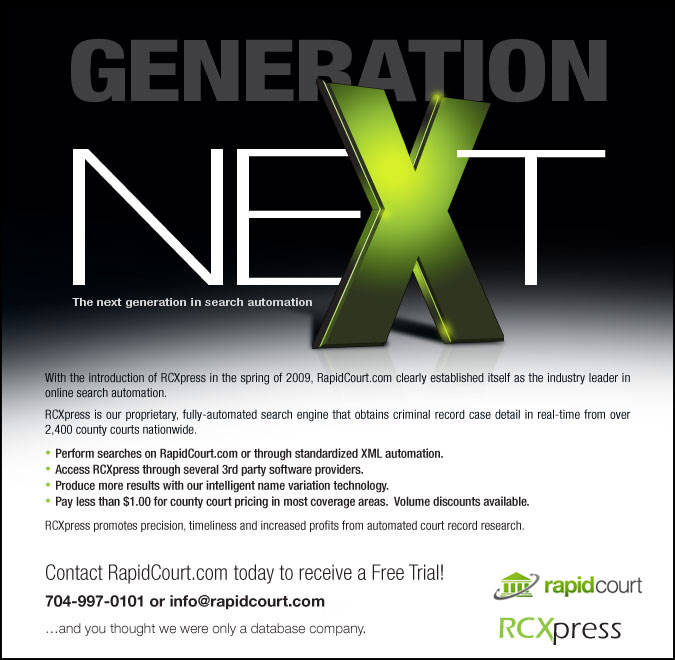
Public
Record Update
By Mike Sankey, PRRN
| SAM
and the Excluded Party List System (EPLS) |
At the end
of July 2012, access to the Excluded Parties List System (EPLS)
was taken over by a new system. EPLS, along with Federal Agency
Registration (FedReg), the Central Contractor Registration (CCR),
and the Online Representations and Certifications Application
(ORCA), were migrated into the new System for Award Management
also known as SAM (https://www.sam.gov/portal/public/SAM)
At this time, SAM is overwhelmed and record searching on the EPLS
is still available at https://www.epls.gov/.
Indications are this search feature will eventually be moved to
SAM
Other free search federal government sites commonly used in background
investigations remain unchanged, including:
• Denied Persons List - www.bis.doc.gov/dpl/default.shtm
• Unverified List - www.bis.doc.gov/enforcement/unverifiedlist/unverified_parties.html
Debarred Parties List - www.pmddtc.state.gov/compliance/debar.html
Click here
for a BRB links list of other useful federal search sites.
|
Facts
About the Accuracy and Completeness of State Agency Criminal
Record Repositories |
|
|
|
© BRB Publications, Inc. • www.brbpublications.com
• 800-929-3811 • Fax 800-929-3810
Many employers and state licensing boards depend
on state criminal record repositories as a primary
resource
when performing a criminal record background check.
What these entities do not realize is that
a search of the state criminal record database
may not be as accurate as assumed. There are three
key
reasons why the completeness, consistency, and
accuracy of state criminal record repositories
could
be suspect-
1. Inability to Match Dispositions with Arrest
Records
2. Timeliness of Receiving Arrest and Disposition
Data
3. Timeliness of Entering Arrest and Disposition
Data into the Repository
The basis for this concern is supported by facts
contained in a Study released in November 2011
by the
Bureau of Justice Statistics of the U.S. Department
of Justice1. Consider the following findings from
this Study-
- 9
states reported that 25% or more of all dispositions
received could NOT be linked to the arrest/charge
information in the state criminal record database.
- A
total of 1,753,623 unprocessed or partially
processed court disposition forms were reported
by 18 states.
- 27
states reported a significant backlog for entering
court disposition data into the criminal history
database
To read more, click
here
|
| ANNOUNCEMENTS
(continued) |
Hireright
Applicant Center Mobile Wins Techamerica High-Tech Innovation
Award
HireRight
, Inc., a leader in on-demand employment screening, today
announced that its unique product, Applicant Center Mobile,
a personalized candidate portal, was named the winner
in the Internet/E-Commerce product category in theTechAmerica
High-Tech Innovation Awards. Now in its 19 th
year, this premier business event celebrates excellence
and achievement in the region's technology industry, and
honors local companies, individuals and products that
drive innovation in Southern California. HireRight Applicant
Center Mobile is the industry's only secure, personalized
candidate portal. It helps candidates through pre-employment
screening by allowing them to manage their background
check process in real-time, supply information, view the
status of the check, and access live help through any
mobile device.
For
more information, visit the company's web site at www.hireright.com.

| ECONOMIC
& EMPLOYMENT OUTLOOK |
Airlines,
Autos Boost Durable-Goods Orders
Orders
for big-ticket items such as autos and airlines surged
in July, but other areas of the U.S. manufacturing sector
softened for the second month in a row, according to a
government report.
The
decline in orders for big-ticket items outside the transportation
sector provides further evidence of a broad slowdown in
the U.S. economy. Companies are receiving fewer orders
for expensive goods at home and finding it tougher to
market their wares in overseas markets such as Europe
and China that are slowing.
On
the strength of higher bookings for aircraft and autos,
however, orders for durable goods climbed 4.2% in July
to mark the biggest increase since last December, the
Commerce Department said Friday. Economists surveyed by
MarketWatch had expected orders to jump a seasonally adjusted
3.0%.
To
read more, click here

Employment
Gains for August 2012 Won't Affect Current U.S. Jobless
Rates
Hiring will continue steadily in the manufacturing and
service sectors in August-following national labor market
trends-according to the Society for Human Resource Management's
(SHRM) Leading
Indicators of National Employment (LINE) survey
for August 2012.
However,
recruiting difficulty increased slightly in July 2012
for key jobs in manufacturing and services, compared to
July 2011.
The
findings for new-hire compensation were mixed in July
2012, rising slightly in the manufacturing sector, and
falling modestly in the service sector.
"The
good news this month is that the LINE employment expectations
index for August 2012 increased compared with a year ago,"
said Jennifer Schramm, GPHR, manager of SHRM's Workplace
Trends and Forecasting. "This is noteworthy because it
is the first time since April 2011 that the year-over-year
comparisons for employment expectations showed an increase
in both sectors."
Source:
August 2012 SHRM LINE Report
To
read more, click
here

ASA
Staffing Index Monthly Report: August 2012
Staffing
employment in August is up 6.0% from August 2011, according
to the ASA staffing Index. The index value for the month
of August is 92, indicating that staffing employment is
approximately 0.9% higher than that reported for July.
Typically, staffing employment peaks between mid-November
and mid-December each year, after which it dramatically
declines for several weeks before turning upward in mid-January.
According to the index, since the beginning of 2012, temporary
and contract employment has grown 23.5%.
To read more, click
here

Drug
Screening Now Required for People Seeking Welfare Benefits
in Utah
People seeking welfare benefits in Utah must now take
an online drug-screening survey, designed to determine
if they are likely to have a substance use disorder. Those
who receive a high score will be required to take a drug
test. A person with a positive drug test will have to
enroll in a drug treatment program and stay off drugs,
or else their benefits will be cut off. The survey, created
by the SASSI Institute, is 94% accurate. According to
Utah State Representative and bill sponsor Brad Wilson,
an estimated 5 to 10% of welfare recipients are drug-dependent.
Michigan and Florida have already faced legal challenges
when they mandated drug testing for welfare recipients.
In both cases those laws were struck down as unconstitutional.
Many other states have also been considering similar measures.
To read more, click
here

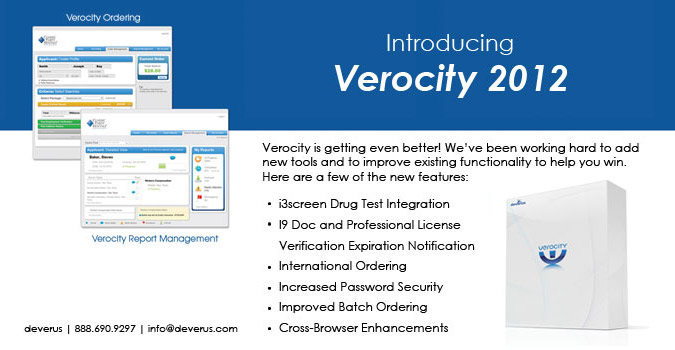

|
Ohio
Uses Fingerprint Scans to Fight Prescription Drug Abuse
A pilot program in Ohio is using fingerprint scans in
an effort to fight prescription drug abuse. Patients submit to
a scan before seeing doctors in one hospital system, while several
pharmacies are using the scans for patients filling prescriptions.
Participation in the program is voluntary and if the pilot program
is successful, the scans could become more widespread throughout
the state. Once the fingerprint is scanned, the data is instantly
uploaded to the patient's electronic medical record. The information
will help track how many times the patient has visited the doctor
and pharmacy, and how many pills the patient has been prescribed.
The instant information provided by the fingerprints will provide
data more quickly than Ohio's prescription drug monitoring program,
which has a one-week lag in uploading patient data.
To read more,
click here

How's
Your Drug-Screening Program?
FightReady's
co-founder, Bill Judge believes the following are the most common:
mistakes employers make when implementing a drug screening program:
· Have
a policy but keep it in a drawer and don't look at it
· Follow
the Department of Transportation's (DOT) procedures for employees
who aren't regulated by DOT
· Enforce
a single nationwide policy
· Fail
to train employees and managers
To read more,
click here

Confidentiality
of the Accreditation Process
I was speaking
with the owner of a CRA about accreditation when he told me that
he had heard from four non-accredited firms that they were afraid
of accreditation because they had direct, fierce competitors on
the accreditation committee and were worried about confidentiality.
They were worried that their competitors might see clients, proprietary
processes, procedures or technology.
There's a
few reasons to not get accredited, very few good reasons not to
get accredited, but the disclosure of proprietary information
is neither. In creating the NAPBS accreditation process and procedure,
our elected board members did think of this and proactively address
it.
The first
and primary protection is that the auditor is an independent third
party. He is not a CRA and auditing is his business. He reviews
the material; he performs the on-site inspection and then makes
a recommendation to the accreditation committee. And he keeps
the all information confidential.
The accreditation
committee does not see the submission submitted by the applying
CRA. The materials that the committee may see is limited and clearly
spelled out in the accreditation procedure.
To read more,
click
here

STOP
STRUGGLING WITH WRITING AND PUBLISHING YOUR NEWSLETTER: |

We can help
you have a high quality e-newsletter to help nurture your relationship
with your clients and attract new clients. Our customized newsletter
service will take over your newsletter task or create a new one
for you. We can manage the creation of your newsletter for you.
We are constantly
researching information to use for The Background Buzz and
you can put our research to use for you. Using the information
rich content from The Background Buzz (minus the ads
and competitors information) we will create a custom newsletter
for you.
Use your staff’s
time to do more valuable work and save all the hassle of researching
or writing articles, formatting and managing all the other ezine
tasks with our customized ezine process.
Contact Barry
Nixon at 949-770-5264 or at wbnixon@aol.com
for more information.

One
Site! Many Suppliers! |
Looking
for the Top Suppliers in the Industry? Need to find a new Supplier?
Visit our VENDOR
SHOWCASE which features suppliers to the Background
Screening Industry.
2012
Winter Edition of Suppliers to the Background Screening industry
Guide
Now Available!
Click
here or on image to get a copy
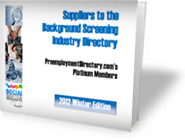
Contact
Barry Nixon at wbnixon@aol.com
for information on getting your firm listed in the Summer Edition.

The
Summer/Fall Edition Coming Soon!

List
of Top Ten I-9 Audit and E-Verify Resources
Veterans
and novices to the I-9 and E-Verify field can access a variety
of online resources available at their fingertips. Here's our
list of favorites (in no particular order). Did any of these
make it to your list?T9o
To see
the Resource list click here

|  |
The Proposed New I-9 Form: Why Employers Should Prepare
Now
This coming fall, the Department of Homeland
Security may release its updated version of the Form I-9.
The new form is likely to be 80% larger than before, increasing
from a five-page document to nine pages and will include
several changes over the previous version. While some
of the changes promise to facilitate more accurate completion
of Form I-9, the new document also leaves and creates
many gray areas, without clarification in the instructions
about what is required. These changes present new possibilities
for errors and put employers at greater risk of receiving
audits and fines. While avoiding errors is of great importance
for employers, there are also areas of the form that are
causing greater public concern around privacy issues and
processes, such as the inclusion of a 3-D barcode. It
is imperative that employers understand the proposed changes,
be ready to supply the necessary information, and are
prepared to update training materials.
To
read more, click here |



New
White Paper From HR Marketer

White Paper Social Influence:
Thriving in a New World of Media Relations
Social media
has created a world of dizzying potential: it's incredibly easy
to share your news with press, analysts, and decision-makers.
Yet media relations is tougher than ever! As the pendulum swings
from print to online media, the traditional roles of journalists
and analysts are merging into a community of bloggers, HR professionals,
consultants and other influencers.
To
download the free white paper click here

Data
Protection Laws of the World Handbook
In April DLA Piper published the first edition of the
Data Protection Laws of the World Handbook 2011/2012 ("the
Handbook").
The Handbook offers a high-level snapshot of selected features
of national laws as they currently stand in 58 jurisdictions across
the world. It is intended to provide a quick overview of features
of data protection law that are often of greatest practical significance
to businesses, such as international data transfer restrictions,
security obligations and breach notification requirements. Also
included is a section on enforcement, as this is always an important
consideration in assessing the risk presented by any jurisdiction.
The Handbook
has been prepared utilising extensive international coverage of
both DLA Piper and other law firms, whose details are set out
in the Handbook.
To download a copy of the publication go to http://www.dlapf.com/keeping-you-posted/0/0/all/1/291

International
Assignments on the Rise
Nearly half of the multinational companies responding to a recent
survey expect to increase their international assignments through
2014, despite the high costs involved for such assignments. Towers
Watson, a global professional services company and Worldwide ERC,
a workforce mobility group, conducted the online survey with 113
respondents from September 2011 to January 2012. They then supplemented
the report with interviews from some of the companies for its
2012 Global Talent Mobility Study,released
in July 2012.
U.S.-based companies led the way in the number of multinationals
expecting to increase the number of their traditional international
assignments (54 percent), followed by Asia-based companies (43
percent). Traditional, long-term assignments generally last one
to five years and short-term assignments less than a year, according
to a Towers Watson spokesman. Organizations headquartered in Europe
were more cautious in their expectations over the next several
years, with only 26 percent planning to increase such assignments
and 40 percent expecting to decrease the number of employees they
will send on international assignments.
To read more,
click
here
Coming
to a Workplace Near You: Random Drug Tests?
Random drug testing among employers in Canada is no where near
as widespread as it is in the U.S., largely due to a tangle of
constitutional rights, legislation, and privacy laws that make
such practices a legal uncertainty. However, with the Canadian
Supreme Court set to a hear a high profile case on the issue this
fall, and private and public sector employers across the country
implementing some form of random drug screening program, there
is a chance that the practice will become more common in Canada.
But employers hoping for a blanket green light like the U.S. will
be disappointed. The best guess here is that random tests will
only ever be allowed for employees in safety sensitive positions.
And, since alcohol and drug addiction are disabilities under human
rights laws, employers that conduct tests will also have to ensure
they have excellent resources available to help employees who
test positive.
To read more,
click here
A
Push to Protect Personal Data
The State
Council is pushing government departments, banks and e-commerce
companies to better protect people's personal information, with
the release of suggestions on enhancing the security of the data
they collect. In guidelines released Tuesday the State Council
suggested it will help fund new security technologies that promote
digital signatures that could replace simple client-selected passwords.
The development of enhanced security technology will focus on
pilot industries, including software outsourcing services, information
technology services and e-commerce.
"Regulations and laws on personal information protection are urgently
needed, as leaking personal information has seriously affected
the security of all citizens," said Lü Benfu, vice dean of
the Graduate School of the Chinese Academy of Sciences and an
expert in information security. "The first step is to define what
kind of release of personal information is illegal." The seventh
Amendment to the Criminal Law regulated that "whoever illegally
obtains the aforesaid information by stealing or any other means
shall, if the circumstances are serious, be punished." However,
no specific definition of the leakage of personal information
is stipulated.
To read more
click
here
Germany:
New EU Data Protection Regime Will Bring Significant Changes
On 25 January
2012 the Commission's official proposal
for the reform of the European Data Protection Directive 95/46/EU
was presented. We have analysed this 119-page draft and have summarised
its main aspects. Although there will be further changes to the
draft before its envisaged entry into force in 2015/2016, the
decisive legislative phase begins now, with the possibility for
interest groups to exert their influence.
On the whole,
the Regulation is essentially in line with the law applicable
in Germany to date. However, there will be numerous significant
amendments in future.
To read more
click here (Complimentary registration
required)
Hong
Kong Privacy Commissioner Publishes Guidance on the Handling of
Data Access Requests and the Charging of Access Fees
The Hong
Kong Privacy Commissioner for Personal Data recently issued a
guidance note to provide data users with assistance on how to
comply with data access requests, as well as how to calculate
the fees to be charged in connection with such Access Requests.
The Guidance Note was in part a response to the increasing number
of complaints received by the Commissioner relating to Access
Requests in recent years, approximately 10% of which concerned
excessive Access Fees. Organizations may wish to establish detailed
guidelines and procedures for the handling of Access Requests
(including calculating Access Fees), to ensure that such requests
are dealt with promptly and efficiently, and in accordance with
the Ordinance. Failure to comply with the requirements in the
Ordinance may constitute an offence and render the data user liable
to a maximum fine of HK$10,000 (roughly 1,300 U.S. dollars).
To read more, click here
National
Vetting Bureau (Children And Vulnerable Persons) Bill
The National Vetting Bureau (Children and Vulnerable Persons)
Bill 2012 is part of a suite of complementary proposals aiming
to provide a legislative basis for the vetting of persons who
seek positions of employment relating to children or vulnerable
persons. Currently persons applying for such positions are vetted
on a non-statutory basis. This Bill will make this vetting mandatory.
The Garda Central Vetting Unit, established in 2002, will be renamed
the National Vetting Bureau. Employers would be wise, therefore,
to ensure that the new provisions, when enacted, are reflected
appropriately in staff handbooks and contracts of employment and
that appropriate training is given. Once the new law is enacted,
any employer who fails to ensure vetting is carried out will face
criminal penalties. The Bill does not apply to any work or activity
undertaken in the course of a family relationship or to persons
who assist occasionally and on a voluntary basis in certain activities
or events be they school, sport or community related.
To read more, click here
Personal
Data Protection Law Coming This Year
The Government will introduce a Data Protection Act
this year, which will regulate the use of personal information
compiled on Jamaicans. The Act will seek to protect the privacy
of individuals in relation to personal data and the regulation
of the collection, processing, storing, use and disclosure of
certain information relating to individuals. Ministry of Science,
Technology, Energy and Mining Minister of State Hon. Julian Robinson,
told the government recently that there is "a need for a more
uniformed, robust and clear mandate to protect privacy and personal
information." Robinson added that a position will be established
for a single information and communication technology regulator
within the next couple of years.
To read more,
click here
Philippine
Data Privacy Law is Signed into Law
On August 15, Philippine President Benigno Aquino III
signed into law the Data Privacy Act of 2012, formally titled
"An Act Protecting Individual Personal Information in Information
and Communications Systems in the Government and the Private Sector,
Creating for this Purpose a National Privacy Commission, and for
Other Purposes". The Act is modeled after the EU Data Protection
Directive and the Asia-Pacific Economic Cooperation (APEC) Privacy
Framework. The Act applies to "the processing
of all types of personal information" and to any person, including
both government and private-sector entities, "involved in personal
information processing including those personal information controllers
and processors who, although not found or established in the Philippines,
use equipment that are located in the Philippines, or those who
maintain an office, branch or agency in the Philippines." The
Act contains provisions that govern the processing of personal
information, the rights of data, and the security of personal
information and sets forth a detailed schedule of penalties for
violations of the Act, which include both imprisonment and fines.
To read more,
click here

BPO
companies more bullish after signing of data privacy law
The Business
Processing Association of the Philippines, the umbrella association
of the information technology-business process outsourcing industry
in the country, said the signing of the Data Privacy Act by Malacañang
into law was an important first step to increase confidence among
foreign investors.
President
Benigno Aquino III signed Republic Act 10173 on Aug. 15, which
requires the protection and preservation of personal data collected
by public agencies and private organizations.
Benedict
Hernandez, BPAP president and chief executive, said the law "brings
the Philippines to international standards of privacy protection."
The act is
based on standards set by the European Parliament and is aligned
with the Asia-Pacific Economic Cooperation Information Privacy
Framework. The Data Privacy Act requires the creation of a National
Privacy Commission under the Transportation Department. Angara
said the implementation of the law would require the training
of experts and development of rules and regulations.
To read more,
click here
ICO
Issues Top Five Areas for Improvement for SMBs
The Information Commissioner's Office (ICO) top five
areas for improvement for small and medium-sized businesses are:
Tell people what you are doing with their data; Make sure your
staff are adequately trained; Use strong passwords; Encrypt all
portable devices; and Only keep people's information for as long
as necessary. The ICO has also recommended that charities and
third sector organizations do a data protection 'check-up', as
they often handle sensitive information such as individuals' medical
details and are potentially more susceptible to encountering a
serious data breach. An ICO advisory visit is offered free of
charge to give small and medium-sized organizations the opportunity
to discuss and receive practical advice from the ICO aimed at
improving their data protection practices.
To read more,
click
here

Next Steps Making midata a Reality
The Government has recently highlighted its proposals
for the ground breaking midata programme, as part of its ongoing
consultation and progress review which sets out measures to provide
it with a legal framework. The Government is committed to putting
the UK at the forefront of this rapidly developing market which
is why the consultation proposes introducing a power that, when
exercised, would give new rights to consumers to access their
personal transaction data in an electronic, portable and machine-readable
format. midata was launched in April 2011 as part of Government's
consumer empowerment strategy, Better Choices: Better Deals. The
programme is a partnership between the UK Government, consumer
groups and major businesses aimed at giving consumers access to
the data created through their household utility use, banking,
internet transactions and high street loyalty cards. Allowing
people to access and use this personal data has the potential
to open up a wealth of opportunities for consumers and businesses,
promoting growth across the wider economy.
To read more, click
here

More Than Half of Employers Don't Test Company Car Drivers
for Alcohol or Drug Use
An annual
survey report by the charity Brake, found that more than half
of fleets (57%) do not test drivers for alcohol, and an even greater
proportion (63%) do not test for illegal drugs. The report was
sponsored by Licence Bureau and includes responses from 134 organizations
on a range of road risk management issues. This report was published
just a few days after the Department for Transport posted provisional
figures for crashes involving drink driving during 2011 which
revealed a 12% increase in deaths and a 3% increase in seriously
injured causalities. Brake's report also benchmarks companies'
approach to other causes of driver impairment such as driver tiredness,
health and eyesight, with four in ten companies not offering eyesight
testing for drivers. The survey report features expert advice
on tackling driver impairment and case studies of companies who
have successfully put procedures in place to mitigate the associated
risks.
To read more,
click here
World
Information Center:

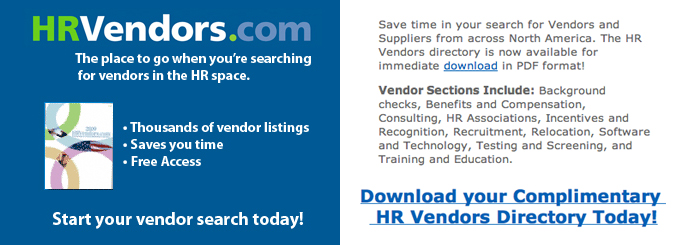

|
ADVERTISERS IN THIS EDITION |


|  |
|
|
| |
|
Background
Screening Jobs |
|
Visit
the Job Board for the Employment and Tenant Screening Industry.
Here you will find resumes of people with industry experience
and employers seeking applicants with experience in Employment
and Tenant Screening and related businesses.
www.backgroundscreeningjobs.com

|
UPCOMING CONFERENCES, COURSES & EVENTS |
2012
Events ( Click
Here to View full list of 2012 Events ) -
Updated Monthly
SHRM
State Conferences, visit
http://www.shrm.org/Conferences/StateAffilliateConferences/Pages/default.aspx
Drug
and Alcohol Testing Industry Association (DATIA), 2012 Training
Course Schedule, visit
http://datia.org
SAPAA
Training Institute Learning Events, http://www.sapaa.com/
CUPA-HR
Conferences: http://www.cupahr.org/
World
Federation of People Management Associations, Events,
http://www.wfpma.com/events/by-region#quicktabs-tab-view__events__page_3-4

|
|
 ‘Ne y windiga’ which
is good day!
‘Ne y windiga’ which
is good day!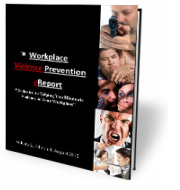 Also while on the subject of
workplace violence many of you also know I publish the leading
newsletter focused on workplace violence, The Workplace
Violence Prevention eReport. It is distributed every
other month to Security, Human Resources, Threat Management,
Risk Management and Safety professionals. I want to remind our
Diamond sponsors we not only feature your contributed articles
in the regular column Inside Background Screening, but you also
may contribute articles to be considered in the regular article
section at any time.
Also while on the subject of
workplace violence many of you also know I publish the leading
newsletter focused on workplace violence, The Workplace
Violence Prevention eReport. It is distributed every
other month to Security, Human Resources, Threat Management,
Risk Management and Safety professionals. I want to remind our
Diamond sponsors we not only feature your contributed articles
in the regular column Inside Background Screening, but you also
may contribute articles to be considered in the regular article
section at any time. 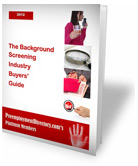 2012 Annual Background
Screening Industry Buyers Guide
2012 Annual Background
Screening Industry Buyers Guide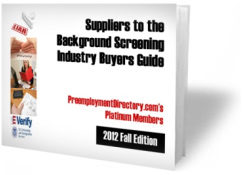 Also suppliers we are working
on the Summer/Fall edition of the Suppliers to the Background
Screening Industry Buyers Guide. Remember Platinum
Members your listing in the Suppliers to the
Background Screening Industry Buyers Guide is complimentary.
To view the Winter edition
Also suppliers we are working
on the Summer/Fall edition of the Suppliers to the Background
Screening Industry Buyers Guide. Remember Platinum
Members your listing in the Suppliers to the
Background Screening Industry Buyers Guide is complimentary.
To view the Winter edition 















